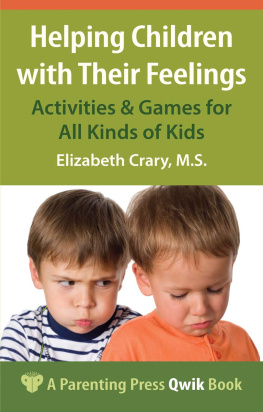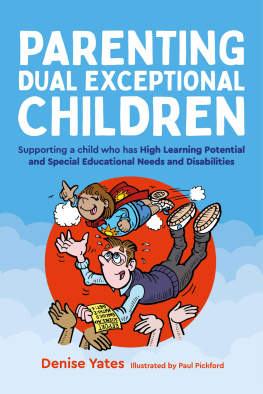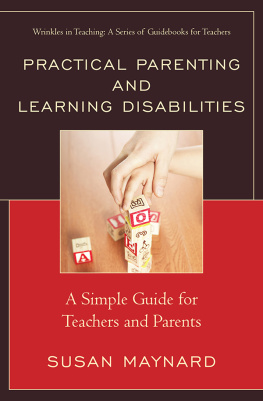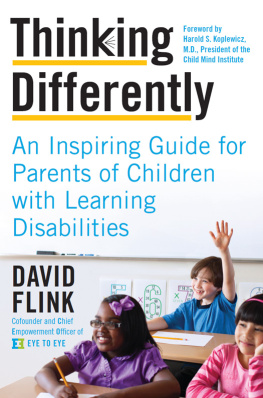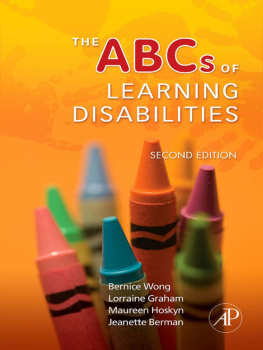Cover
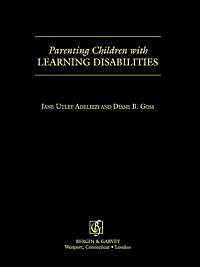
| title | : | Parenting Children With Learning Disabilities |
| author | : | Adelizzi, Jane Utley.; Goss, Diane B. |
| publisher | : | Greenwood Publishing Group |
| isbn10 | asin | : | 0897897722 |
| print isbn13 | : | 9780897897723 |
| ebook isbn13 | : | 9780313003936 |
| language | : | English |
| subject | Learning disabled children--Education--Parent participation--Handbooks, manuals, etc. |
| publication date | : | 2001 |
| lcc | : | LC4704.5.A34 2001eb |
| ddc | : | 649/.15 |
| subject | : | Learning disabled children--Education--Parent participation--Handbooks, manuals, etc. |
Page i
Parenting Children with LEARNING DISABILITIES
Page ii
This page intentionally left blank.
Page iii
Parenting Children with LEARNING DISABILITIES
JANE UTLEY ADELIZZI AND DIANE B. GOSS

BERGIN & GARVEY
Westport, Connecticut London
Page iv
Library of Congress Cataloging-in-Publication Data
Adelizzi, Jane Utley
Parenting children with learning disabilities / Jane Utley
Adelizzi and Diane B. Goss.
p. cm.
Includes bibliographical references.
ISBN 0897897722 (alk. paper)
1. Learning disabled childrenEducationParent participationHandbooks,
manuals, etc. I. Goss, Diane B. II. Title.
LC4704.5.A34 2001
649.15dc21 00064210
British Library Cataloguing in Publication Data is available.
Copyright 2001 by Jane Utley Adelizzi and Diane B. Goss
All rights reserved. No portion of this book may be reproduced, by any process or technique, without the express written consent of the publisher.
Library of Congress Catalog Card Number: 00064210
ISBN: 0897897722
First published in 2001
Bergin & Garvey, 88 Post Road West, Westport, CT 06881
An imprint of Greenwood Publishing Group, Inc.
www.greenwood.com
Printed in the United States of America

The paper used in this book complies with the Permanent Paper Standard issued by the National Information Standards Organization (Z39.481984).
10 9 8 7 6 5 4 3 2 1
Page v
CONTENTS
| Saturdays Child | |
| Are You Saturdays Child? | |
| Pieces of the Puzzle: Learning Deficits and Disabilities | |
| Diagnosis of Learning Disabilities | |
| Our Great Brain: Learning and Functioning | |
| The Socioemotional Impact of Learning Disabilities on the Child | |
| The Helping Hand: What You Can Do to Help Your Child Learn | |
| The Spoken Word: Listening, Speaking, and Silence | |
| The Written Word: Reading and Writing | |
Page vi
| The Language of Math | |
| Tools of the Trade: Using Technology to Enhance Learning | |
| Navigating the System | |
| The Holistic Approach: Crunchy Granola, Intellectualism, and Wisdom for the Family | |
Appendix | |
Bibliography | |
Suggestions for Further Reading | |
Index | |
Page 1
SATURDAYS CHILD
Mondays child is fair of face,
Tuesdays child is full of grace.
Wednesdays child is full of woe,
Thursdays child has far to go.
Fridays child is loving and giving,
Saturdays child works hard for a living.
But the child who is born on the Sabbath day
Is good and kind in every way.
Anonymous |
You are probably familiar with this poem anonymously written to help children memorize the days of the week. Each line seems to hold such special meaning. When we realized that we were both born on Saturday, we laughed about what an apt description came with that daySaturdays child works hard for a living! As we looked past our personal experiences in connection with the poem, we quickly recognized how well the description of Saturdays child fit the children, adolescents, and adults with learning disabilities who have become our collective lifes work. They worked so very hard every day in order to keep up, measure up, and compete with their peers. Their goals are often to gain the respect and admiration of their teachers, parents, and
Page 2
friends. It sounds simple to most people, but to the 10 to 20 percent of the general population with learning disabilities (LD), attention deficit disorder (ADD), or dyslexia, it can be a monumental task that requires a great deal of energy, sweat, prayer, and support. We knew this guidebook was about Saturdays child.
As we researched the origin of Saturday, and moved past the Old Testament, we learned this was the name given to the seventh day of the week in honor of the Roman god Saturn. Saturns Day seemed to represent what the Romans referred to as the learning principles. This certainly seemed significant to us, as our chief concern was with those individuals who were often challenged in their learning. Saturday seemed to symbolize the last day, the day of rest in the week. For many of us Saturday means a day away from the grind of life, the challenge of learning, the stage upon which all mistakes are publicized. Saturday can be the day to watch cartoons, color in a favorite book, pretend your bicycle is a horse, have a tea party with your dog, build a castle, or look at the pictures and not read the words. Saturday could be the reward after all of the hard work! This felt hopeful.
As the poem tells us, Saturdays child works hard for a living. The child who struggles to maintain a sense of equilibrium in her life when the sky is falling, when the headless horseman is chasing her, or when the mirror on the wall reflects a child who is dancing as fast as she can indeed works hard for a living. She works especially hard because she doesnt learn the same way that her brother, who earns As and Bs in school, learns. She has trouble reading, understanding her math, and like Alice in Wonderland, life around her looks and feels distorted and misshapen sometimes. She keeps bumping into things, both figuratively and literally. Its so difficult to explain to her mother why she feels this way. Its easier to just be quiet about it, and pray that things will become easier and clearer tomorrow. Her learning disability has been diagnosed for two years now. Her educational plan has been implemented in the eyes of special services at her elementary school, and still she feels dumb. Her mother feels frightened as she watches her daughter grow increasingly more quiet, isolated. She suspects that her daughter is depressed, but isnt sure that kids really can get depressed. Who should the mother talk to?
Next page

